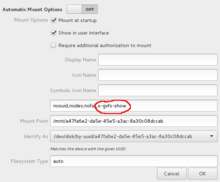GNOME Disks is a graphical front-end for udisks.[3] It can be used for partition management, S.M.A.R.T. monitoring, benchmarking, and software RAID (until v. 3.12).[4] An introduction is included in the GNOME Documentation Project.
 | |
 GNOME Disks 40 (released in March 2021) | |
| Original author(s) | Red Hat |
|---|---|
| Developer(s) | David Zeuthen |
| Stable release | 44.0[1] |
| Preview release | 41.beta[2] |
| Repository | |
| Written in | C |
| Operating system | Linux |
| Platform | GNOME |
| Size | 1.4 MB |
| Available in | Multilingual[which?] |
| Type | Partition editor |
| License | GPL-2.0-or-later |
| Website | apps |
Disks used to be known as GNOME Disk Utility or palimpsest Disk Utility. Udisks was named DeviceKit-disks in earlier releases. DeviceKit-disks is part of DeviceKit which was planned to replace certain aspects of HAL. HAL and DeviceKit have been deprecated.
GNOME Disks has been included by default in several Linux distributions including Debian, Ubuntu, Linux Mint, Trisquel, Fedora, Red Hat Enterprise Linux and CentOS.

See also
edit- List of disk partitioning software
- System monitor
- Comparison of S.M.A.R.T. tools
- GParted – another alternative
- Disk utility
References
edit- ^ https://gitlab.gnome.org/GNOME/gnome-disk-utility/-/tags/44.0.
{{cite web}}: Missing or empty|title=(help) - ^ https://gitlab.gnome.org/GNOME/gnome-disk-utility/-/tags/41.beta.
{{cite web}}: Missing or empty|title=(help) - ^ Richard Petersen (December 1, 2010), Fedora 14: Administration and Security, Surfing Turtle Press, pp. 147–, ISBN 978-1-936280-23-0
- ^ "Disk Utility management for GNOME". 18 January 2014.
- ^ "udisks2 readme". GitHub. 8 June 2022.